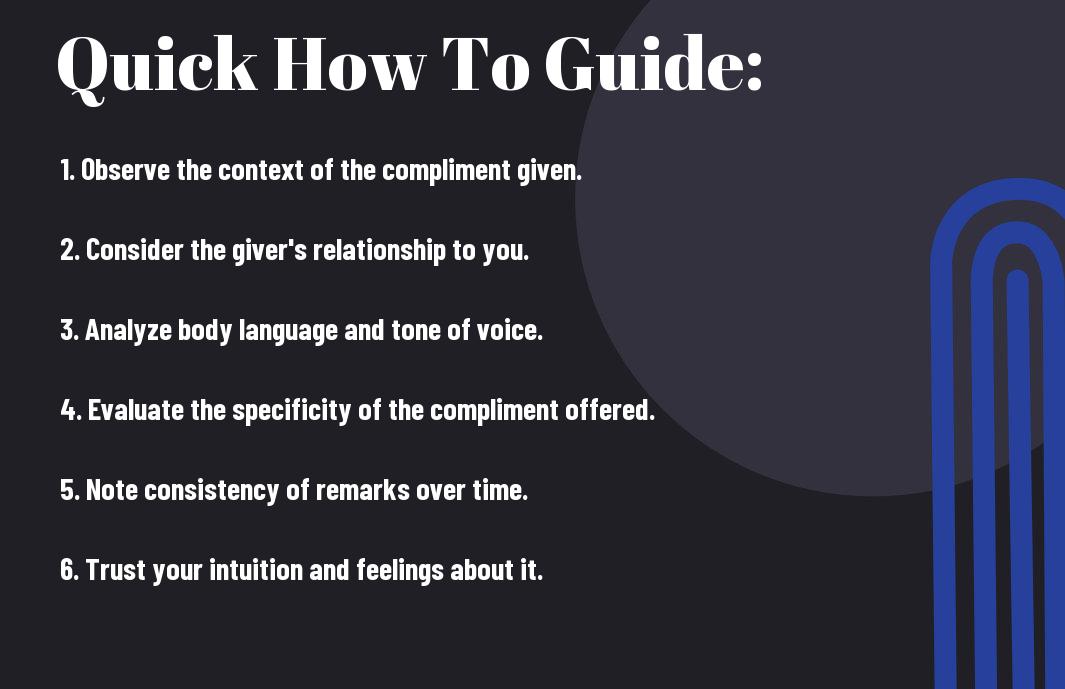There’s a fine line between a genuine compliment and mere flattery. As you navigate social interactions, recognizing the difference can enhance your relationships and boost your self-awareness. Genuine compliments stem from sincerity and appreciation, while flattery often lacks authenticity and can feel manipulative. In this guide, you will learn key characteristics to help you discern the true intentions behind the words, empowering you to respond appropriately and build deeper connections.

Understanding Compliments
Your ability to recognize and appreciate genuine compliments is imperative for building healthy relationships. A compliment is a positive remark that acknowledges the qualities, achievements, or efforts of another person. Understanding the distinction between a sincere compliment and flattery can significantly enhance your interpersonal skills and self-awareness.
Definition of a Genuine Compliment
Some compliments stem from authenticity and a desire to uplift others. A genuine compliment reflects the speaker’s honest appreciation for something specific about you, whether it’s your skills, appearance, or character. When given sincerely, a genuine compliment can foster trust and promote a positive atmosphere.
Characteristics of Flattery
The essence of flattery lies in its superficiality. Flattery is often exaggerated or insincere, aiming to gain favor or manipulate. Unlike genuine compliments, flattery tends to focus on hyperbolic praise rather than specific attributes or actions. This can leave you feeling uneasy, as the intent behind flattery is often self-serving rather than genuinely appreciative.
Understanding the distinction between flattery and genuine compliments can help you navigate social interactions effectively. Flattery often lacks depth, relying on vague statements that seem too good to be true, while genuine compliments are rooted in specific observations. If someone frequently compliments you in a way that feels overly enthusiastic or feels disconnected from your reality, it’s likely flattery. Recognizing these traits can safeguard you from the insincerity that flattery encompasses.

How to Differentiate
There’s a fine line between a genuine compliment and mere flattery. To effectively differentiate the two, you need to scrutinize the intentions behind the words and analyze the overall context. A genuine compliment often stems from a place of sincerity and respect, whereas flattery may come off as insincere or self-serving.
Factors to Consider
One way to discern authenticity is to look into specific elements surrounding the compliment. Consider the following:
- Context of the compliment
- Frequency and pattern of similar comments
- Relationship with the person giving the compliment
Recognizing these factors can aid you in gently assessing the reliability of the compliment you receive.
Body Language Signals
Factors like body language and tone of voice play a significant role in deciphering genuine compliments. Observing the non-verbal signals accompanying the words can provide valuable insight.
For instance, genuine compliments are often paired with open body language, direct eye contact, and a warm tone. If someone is leaning towards you, smiling genuinely, and maintaining engagement, the compliment is likely heartfelt. Conversely, crossed arms, lack of eye contact, or a monotone voice could signal flattery. By paying attention to these subtle cues, you can better assess whether the praise is sincere or just an empty gesture.
Tips for Recognizing Genuine Compliments
Unlike flattery, genuine compliments stem from authenticity and sincere intentions. Here are a few tips to help you discern the difference:
- Pay attention to the tone and body language of the person giving the compliment.
- Notice if the compliment is specific and detailed rather than vague.
- Evaluate whether the compliment aligns with the usual feedback you receive.
Recognizing these indicators can help you appreciate true praise.
Context Matters
Genuine compliments are often contextually relevant, highlighting specific achievements or actions in a particular situation. They arise in moments where your efforts are recognized, making them feel timely and sincere.
Consistency Over Time
You should be mindful of the frequency and consistency of compliments you receive. When someone consistently acknowledges your strengths or improvements, it reflects a genuine understanding of your character and contributions.
Recognizing the value in consistent feedback can enhance your confidence and motivation. When compliments don’t just occur sporadically, but rather are a consistent part of your interactions, it underscores authenticity and the sincerity behind those words. Look for patterns in how people speak about your work or your qualities over time, as this can lead to a clearer understanding of genuine appreciation versus insincere flattery.
The Impact of Flattery
After encountering flattery, you may find yourself feeling elated or validated in the moment, but this inflated sense of self-worth may not last. Flattery often serves as a social lubricant, allowing one to navigate complex social landscapes, yet it can lead to misunderstandings about genuine relationships. You might start to question the authenticity of compliments you receive and become wary of others’ intentions, affecting your overall outlook on interpersonal connections.
Psychological Effects
For many, flattery can create a temporary boost in self-esteem, tricking you into believing you are more appreciated than you truly are. This fleeting lift often leads to dependency on external validation, which can hinder your self-confidence. In the long run, you might find that your self-worth becomes intertwined with how others perceive you, making it difficult to maintain a stable sense of identity.
Implications for Relationships
Some implications of flattery for relationships include the potential erosion of trust and authenticity. When you encounter flattery, you may question the sincerity behind the words and start to doubt the motivations of those around you. Such uncertainty can lead to superficial connections rather than meaningful ones, as you become adept at deciphering the difference between genuine compliments and insincere praise.
Another aspect to consider is how flattery might cause dependency in your relationships. If you find yourself often seeking approval through flattery, you may overlook healthier forms of communication that foster deeper connections. This not only affects your self-esteem but can also drive a wedge between you and others, as genuine relationships are built on authenticity rather than superficial praise. Your ability to establish trust in relationships hinges on recognizing the difference between true admiration and flattery, guiding you towards more fulfilling interactions.
How to Respond to Compliments and Flattery
Keep your response sincere and aligned with the nature of the compliment. When someone genuinely acknowledges your efforts or qualities, express gratitude with a simple “thank you.” It’s important to acknowledge the other person’s intention, which fosters positive connections. For flattery, use your discernment to gauge the intent behind the words and respond appropriately, ensuring you maintain your authenticity.
Accepting Genuine Compliments
Compliments can be uplifting and motivating, affirming your worth and efforts. When someone offers you a genuine compliment, embrace it graciously by acknowledging their kindness. A heartfelt “thank you” goes a long way in creating a positive atmosphere and encourages further authentic interactions.
Handling Flattery Gracefully
Gracefully managing flattery involves understanding the difference between sincere recognition and superficial praise. When you encounter flattery, respond with polite acknowledgment without fully embracing the insincerity implied. A light-hearted remark like “That’s very kind of you” acknowledges the gesture while allowing you to maintain your ground and authenticity.
Genuine interactions are necessary for building trust and connection. If you sense that someone is flattering you rather than truly complimenting your abilities or achievements, it’s okay to remain gracious yet guarded. You can thank the person for their words while subtly redirecting the conversation back to more meaningful topics, allowing you to maintain your sense of self and authenticity in the situation.
Enhancing Your Complimenting Skills
For anyone looking to improve how they give compliments, understanding the nuances between genuine praise and insincere flattery is vital. You can learn more about the Difference Between Flattery and Compliment to help you navigate this important skill. Strive to be sincere and specific in your compliments, which opens the door to more meaningful connections.
Offering Genuine Compliments
Offering a genuine compliment involves recognizing something unique about the individual and expressing it genuinely. You should focus on specific traits or actions that you truly appreciate, as this will make your praise feel more heartfelt and impactful. When you highlight what truly stands out about someone, it builds a stronger rapport.
Avoiding Flattery
Enhancing your ability to avoid flattery is vital for crafting authentic interactions. You can begin by practicing honesty and observing the difference between genuine admiration and mere niceness. Focus on the intention behind your words; if you’re complimenting solely to gain favor, it’s likely flattery.
Genuine compliments stem from a place of authenticity and can significantly impact relationships. Strive for transparency in your compliments and assess whether your praise reflects your true feelings. If you find yourself exaggerating or making praise solely to please, you may be crossing into flattery territory. Aim to be sincere, as this will create more meaningful exchanges in your communication.
To wrap up
Taking this into account, distinguishing between a genuine compliment and flattery is imperative for building authentic relationships. You should pay attention to the context, the sincerity of the speaker, and your own feelings about the comment received. Genuine compliments are specific, heartfelt, and often backed by a deeper understanding of your strengths. In contrast, flattery tends to be vague, overly general, and delivered for ulterior motives. By being mindful of these differences, you can better appreciate sincere expressions of admiration while remaining cautious of insincere praise.










